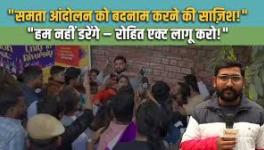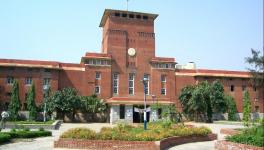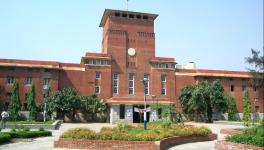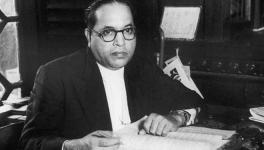For a Bahujan Economics -- A Personal Statement

Display on the walls of the Department of Economics, Delhi School of Economics | Facebook
The cost of writing this article could be high, from being looked at differently to being labelled inappropriate for academia. But the hope is that more students from Scheduled Caste (SC) and Scheduled Tribe (ST) communities will be motivated to aim to be economists, and, in the process, be inspired to continue the struggle for egalitarian principles initiated by leaders of social justice like Babasaheb Dr BR Ambedkar.
How does it feel for someone to top the batch of more than 200 students in the MA Economics course in one of the best colleges in India, the Delhi School of Economics (DSE)? The tremendous jump in confidence that the person would have experienced is unimaginable to most of us. On the other hand, after barely passing all the papers, the only feeling some of us have come to experience is of restlessness caused by the question: Why, except for two or three students, are all SC-ST students failing in all or at least two papers out of three? We fail, repeat, pass but the pass percentage rarely crosses 50 percent, which is still 10 percent less than a first class.
Making descriptive tables of the results and showing them to the "concerned" people was one way we thought we would be able to answer some of those questions regarding the institutional set up that is intellectually pauperising the minds of the oppressed sections. But it kept on getting more complicated and even more demoralising with every passing semester at DSE1.
In seeking answers and solutions to fight this intellectual apartheid-like condition, different stakeholders in college gave us a number of explanations, like, this is the problem with reservation (affirmative action) through which we got admission; teachers aren’t responsible; we have to study by forming groups or attend remedial classes, etc. But the reason which was repeatedly quoted was "it is a structural problem". While none of these reasons helped any of us, most of the people could conveniently ignore the ground reality as they had some other explanation for the fact that SC and ST students are still kept away from becoming a part of the academia.
A Dalit woman, my classmate at DSE, having studied till class 12th in a Hindi-medium public school, was labelled non-meritorious despite being one of the top scorers in undergraduate in Economics.
For some time, we held on to hope and could somehow keep away the inferiority complex induced in us by everyday humiliation at the college. And we continued to believe in one or the other reasons listed above. But as the semesters passed, we witnessed many dropouts, some barely passing with marks not enough to get admission even in Indian universities (forget about going abroad for a PhD) and some taking as many attempts as they could to pass one or two papers and finally receive the "prestigious" degree.
It is not just the marks but it is also about being able to receive letters of recommendation from professors or be accepted in their closed academic circles. All these incidents, on the one hand, made many of the reserved category students believe that their dream of becoming economists is far from becoming a reality in such circumstances, and, on the other side, it made us come to our own understanding of the structural issue.
To flesh out our experience in the academic space in a more lucid way, I will talk about my time at Lady Shri Ram College for Women in New Delhi but here I will keep the discussion short. It transitioned from late-night bullying of reserved category students in the hostel and mental trauma caused, to finally learning to assert our identity on the campus and forming a support group for each other. This transition could take place for us because we could form a safe space for each other, but most of the students after our batch would have to continue to go through the bullying throughout their time in the college. The initial one and a half out of three years were unbearable.
I remember how, in the first year of college, I wrote a letter to one of my seniors in the middle of the night and slipped the letter under her room’s door. I didn’t have the courage to go talk to her about how suffocating it was in that space or even share the letter directly because of the guilt that was induced in me for taking admission through reservation. The reserved category students were constantly made to feel unfit in that space; they still are. Meanwhile all the privileged ones who felt they belonged to that college and had their presence appreciated have written amazing stories about their time there. Seeing the lack of social and cultural capital in that space, many students belonging to various oppressed sections slowly started finding strength in each other by sharing the pain of every sort and trying to be there for each other.
Is it wrong … to say that this structure that I have been told is the reason for the academic failures of people from my community is the caste structure?
In the process of fighting the guilt induced in us for being reserved category students and of justifying our mere existence and "showcasing our deprivation" and "experiences" to make the point that we deserve to be there, we were left with limited opportunity to appreciate being in one of the best colleges in DU. Thus, the spirit and courage to study and know the subject well or to get acknowledged by the professors for the amount of effort that some of us were putting into academics, all went in vain.
To join the DSE for Masters was a long-cherished dream for many of us. We reached this stage not only because of reservation but because we wanted to equip ourselves with the tools being taught there and expand our knowledge. But on the other side the apprehension of some of "DSE losing its excellence" became stronger day by day as the majority of those performing poorly or rather failing to pass in the exams came from the reserved seats.
Ironically, despite our having such fear and love for the "institution", they understood our failure or poor performance as a structural issue and opined that the MA is not the stage to fill the gap created or left unfilled by the education system. And we agreed with them that any intervention at this level is not going to help us become ‘meritorious’ like the ideal students. But is that it? A Dalit woman, my classmate at DSE, having studied till class 12 in a Hindi-medium public school, was labelled non-meritorious despite being one of the top scorers in undergraduate in Economics. A tribal woman, who passed multiple competitive exams, had to drop the course as she was also deemed non-meritorious.
So, why would these achievements or capabilities of ours not count in defining our merit on par with them? When the current gap or failure is regarded as a structural issue by different stakeholders, why then is the need to democratise and transform the present structure conveniently ignored? As a result of the above mentioned irony and tension, by the end of our stay, it wasn’t our dream and desire to learn at the college and the struggle with which we reached till this stage that united us. Instead, the fact that we had come there through reservation and didn’t have the merit to belong to their group is what clubbed us together as a group.
The many exclusionary processes inherent in any academic institution that are intellectually pauperising the minds of the oppressed are believed by many to be a structural issue. But what is the endogenous process which is creating this structural issue? The representation of women is low in media, but most of those who do manage to mark their presence there belong to the upper castes. Similarly, the field of economics is dominated by upper caste men and most of the female economists have an upper caste identity.2 Is it wrong, then, to say that this structure that I have been told is the reason for the academic failures of people from my community is the caste structure?
People have many suggestions to give. For instance that the primary education system needs to be improved, so that the base for higher education is built properly. And then the system at the undergraduate level needs to be improved to prepare students for the mechanics of what will be taught at the MA level etc. All these arguments are valid. But is anyone from the oppressed community responsible for any of this?
The present idea of merit in India isn’t defined by anyone from the Bahujan3 communities. The parameters for merit are set by those coming from the most privileged background or rather the upper caste people whose imagination would be formed and influenced by their own life and their own circles. But we are being judged on those parameters right from the beginning and clearly all of us, with a few exceptions, are failing on these parameters. Here I remember Shanmugam Anitha, who belonged to a poor Dalit family in Tamil Nadu and wanted to become a doctor but ultimately was forced to kill herself after a lone fight for justice at the age of 17.4 Our academic record is indeed a structural issue, but that structure belongs to the privileged and the consequences we bear.
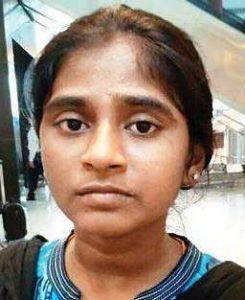
Shanmugam Anitha who killed herself at 17 after an unsuccessful fight for justice | Twitter
Our research interests, way of learning and understanding largely don’t fit well with what is practiced in the privileged circles, but instead of revisiting their practices they label us as "non-meritorious". For someone having more experience of being discriminated against rather than getting the opportunity to engage in discussions with the faculty, the interest and motivation are likely to lie in something unimaginable by most of the existing faculty members.
Last summer I along with a senior conducted a survey on maternity entitlements to document the hardships faced by pregnant and lactating women in rural India. Out of 98 women we spoke to, a majority belonged to SC/ST communities. Talking to them helped us realise the importance of social policies for women from these communities who are in a very vulnerable state. The report of this research got published in The Hindu, after which I received a number of emails from across the country praising the work, but despite that I will remain non-meritorious for the academic circles.
Who else but economists from the Bahujan communities would understand the importance of amalgamating the demand for dignity with that for economic freedom?
I strongly believe that we need more economists who would work for our people and not just work on our people, economists who know what a policy means to the people on the ground, who know the meaning of policy implementation, whose imagination is built by their experiences, in order to aim for an egalitarian society and who also know the pain of appropriation. Let me use this opportunity to share the dream of "Bahujan Economics" to assert the identity of the oppressed in the "discipline left untouched by untouchables". Who else but economists from the Bahujan communities would understand the importance of amalgamating the demand for dignity with that for economic freedom? And who else other than Bahujans, who form the backbone of the country’s economy but have always been left at the receiving end of everything be it two meals a day or dignity, would have a better understanding of it? Because if we keep on letting others judge us on the parameters set by them, our entire energy will be wasted in justifying our existence and regretting becoming part of their space.
As mentioned above, most of us have experienced multiple forms of humiliation after becoming part of "prestigious institutions" and here I am speaking from the perspective of a generation of failed scholars from my community and my "category-mates". I have learned so much at the colleges where I got the chance to study that I will continue to feel proud to be a part of them. I will encourage SC/ST students to take up the opportunity to learn tools that are being taught in various courses in economics at DSE from professors who have a strong grip on their courses. But I would also urge them to take up the case of articulating the need for a "Bahujan Economics".
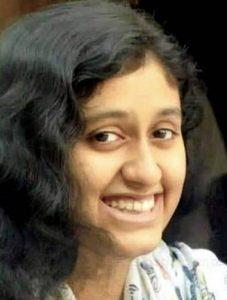
News reports say, Fathima Latheef, the 19-year-old IITM student took her life because she felt she was being harrassed | Twitter
A number of articles came out about the need for representation of women in economics after the 2019 Nobel Prize winners for Economics were announced5. On the other hand, one Black woman economist said “I would not recommend my own (black) child to go into this field; it was a mistake for me to choose this field. Had I known that it would be so toxic, I would not have.”6 This difference is not that historically oppressed groups don’t want to be in academia, but it is because of the adverse environment and complete lack of support to let them pursue their dreams.
Irrespective of whether they agree or disagree with each other, Indian academics have continued to maintain the "purity" of academia by making it inaccessible to those not having their sort of background. They reject, accept, endorse, or criticise each other's work but at the end of the day they stick together. The privileged, after maintaining their hegemony in the real world, become scholars of theories of deprivation and hence maintain their hegemony in academia too.
The continuous treating of the oppressed as mere variables or their research subjects in the discipline makes it urgent to take up the case for "Bahujan Economics".
A scholar on caste humiliated me for my English, for speaking up about caste identity and for being unable to follow the academic purity that has been set for students. I mention this as an example of discrimination faced by me to make the point that economists aren’t unaware of the word “caste”. In fact they proudly work on caste, publish research papers, books and give lectures too on inequalities and in such a scenario to expect from them anything more than this will be naive on our part. This establishes the point that awareness isn’t the missing part here, especially for academicians who are well read and hence well informed. It is the very sensitivity and knowledge of their privilege which is missing from the crowd that we are talking about.
The idea behind raising a demand for Bahujan Economics is not to advocate for representation itself, which in itself is very important, but it is to put forward the egalitarian idea that we have been fighting for. Babasaheb Ambedkar, along with speaking about representation, also guided us to look at Economics as a tool to be used to ensure a life of dignity for all. He left numerous examples for us: from being the first advocate of maternity entitlements for women working in factories, to fighting for labour rights along with articulating the need for representation of the oppressed7.
The idea behind this write-up is not to narrate the sad story of Dalit-Adivasi lives in academia but to strongly assert the desire we have to attain knowledge.
The continuous treating of the oppressed as mere variables or their research subjects in the discipline makes it urgent to take up the case for "Bahujan Economics". We live in a graded hierarchical caste social order and this undoubtedly would impact the economic realm of society and individuals. Assessing this impact and doing economics is to have an understanding of the common good and well-being too. We should not only limit ourselves to empirical field-based studies but also strive to study, teach, produce theories and also orient and create policies that can change the lives of the dispossessed. After all, how long will the oppressed remain mere variables in all the studies? Like the graded hierarchical social order, why should there be so many dividing blocks among students like us in academia? Our experience, pain and at the same time the idea of rejuvenating the human self so as to fight inequality, humiliation and exploitation (caste and capital) would certainly guide us in actualising the agenda of structural reformation.
The idea behind this write-up is not to narrate the sad story of Dalit-Adivasi lives in academia but to strongly assert the desire we have to attain knowledge. The motive for penning these thoughts is to assert my Dalitness in the so-called merit world as imagined by the privileged in which we are constantly labeled as non-meritorious and also to appeal to Bahujan scholars to make use of their experience and available resources to become Bahujan economists. People are right, no one person can be held responsible for our condition and in this competitive world with scarce resources, the act of introspection is a virtual impossibility for the privileged. That is why the assertion of the oppressed seems like the only way to mark our presence in any field, be it the field of administration, academia or media.
Change is coming; we have come a long way, from being killed brutally for dreaming of education to now asserting our identity, claiming and reclaiming the academic space. Now the way ahead for us is to reach a stage and work for our community, take control of what impacts our lives and write our own story rather than becoming the subjects of study.
Get the latest reports & analysis with people's perspective on Protests, movements & deep analytical videos, discussions of the current affairs in your Telegram app. Subscribe to NewsClick's Telegram channel & get Real-Time updates on stories, as they get published on our website.









